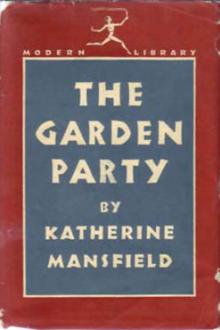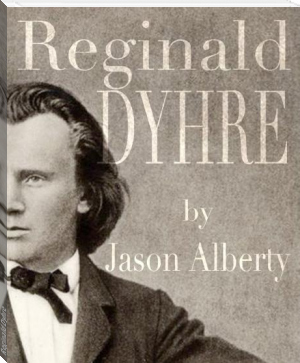Bliss - Katherine Mansfield (paper ebook reader TXT) 📗

- Author: Katherine Mansfield
- Performer: -
Book online «Bliss - Katherine Mansfield (paper ebook reader TXT) 📗». Author Katherine Mansfield
Two big moths flew in through the window and round and round the circle of lamplight.
“Fly away before it is too late. Fly out again.”
Round and round flew; they seemed to bring the silence and the moonlight in with them on their silent wings….
“I’ve two kings,” said Stanley. “Any good?”
“Quite good,” said Beryl.
Linda stopped rocking and got up. Stanley looked across. “Anything the matter, darling?”
“No, nothing. I’m going to find mother.”
She went out of the room and standing at the foot of the stairs she called, but her mother’s voice answered her from the veranda.
The moon that Lottie and Kezia had seen from the storeman’s wagon was full, and the house, the garden, the old woman and Linda—all were bathed in dazzling light.
“I have been looking at the aloe,” said Mrs. Fairfield. “I believe it is going to flower this year. Look at the top there. Are those buds, or is it only an effect of light?”
As they stood on the steps, the high grassy bank on which the aloe rested rose up like a wave, and the aloe seemed to ride upon it like a ship with the oars lifted. Bright moonlight hung upon the lifted oars like water, and on the green wave glittered the dew.
“Do you feel it, too,” said Linda, and she spoke to her mother with the special voice that women use at night to each other as though they spoke in their sleep or from some hollow cave—“Don’t you feel that it is coming towards us?”
She dreamed that she was caught up out of the cold water into the ship with the lifted oars and the budding mast. Now the oars fell striking quickly, quickly. They rowed far away over the top of the garden trees, the paddocks and the dark bush beyond. Ah, she heard herself cry: “Faster! Faster!” to those who were rowing.
How much more real this dream was than that they should go back to the house where the sleeping children lay and where Stanley and Beryl played cribbage.
“I believe those are buds,” said she. “Let us go down into the garden, mother. I like that aloe. I like it more than anything here. And I am sure I shall remember it long after I’ve forgotten all the other things.”
She put her hand on her mother’s arm and they walked down the steps, round the island and on to the main drive that led to the front gates.
Looking at it from below she could see the long sharp thorns that edged the aloe leaves, and at the sight of them her heart grew hard…. She particularly liked the long sharp thorns…. Nobody would dare to come near the ship or to follow after.
“Not even my Newfoundland dog,” thought she, “that I’m so fond of in the daytime.”
For she really was fond of him; she loved and admired and respected him tremendously. Oh, better than anyone else in the world. She knew him through and through. He was the soul of truth and decency, and for all his practical experience he was awfully simple, easily pleased and easily hurt….
If only he wouldn’t jump at her so, and bark so loudly, and watch her with such eager, loving eyes. He was too strong for her; she had always hated things that rush at her, from a child. There were times when he was frightening—really frightening. When she just had not screamed at the top of her voice: “You are killing me.” And at those times she had longed to say the most coarse, hateful things….
“You know I’m very delicate. You know as well as I do that my heart is affected, and the doctor has told you I may die any moment. I have had three great lumps of children already…. “
Yes, yes, it was true. Linda snatched her hand from mother’s arm. For all her love and respect and admiration she hated him. And how tender he always was after times like those, how submissive, how thoughtful. He would do anything for her; he longed to serve her…. Linda heard herself saying in a weak voice:
“Stanley, would you light a candle?”
And she heard his joyful voice answer: “Of course I will, my darling.” And he leapt out of bed as though he were going to leap at the moon for her.
It had never been so plain to her as it was as this moment. There were all her feelings for him, sharp and defined, one as true as the other. And there was this other, this hatred, just as real as the rest. She could have done her feelings up in little packets and given them to Stanley. She longed to hand him that last one, for a surprise. She could see his eyes as he opened that….
She hugged her folded arms and began to laugh silently. How absurd life was—it was laughable, simply laughable. And why this mania of hers to keep alive at all? For it really was a mania, she thought, mocking and laughing.
“What am I guarding myself for so preciously? I shall go on having children and Stanley will go on making money and the children and the gardens will grow bigger and bigger, with whole fleets of aloes in them for me to choose from.”
She had been walking with her head bent, looking at nothing. Now she looked up and about her. They were standing by the red and white camellia trees. Beautiful were the rich dark leaves spangled with light and the round flowers that perch among them like red and white birds. Linda pulled a piece of verbena and crumpled it, and held her hands to her mother.
“Delicious,” said the old woman. “Are you cold, child? Are you trembling? Yes, your hands are cold. We had better go back to the house.”
“What have you been thinking about?” said Linda. “Tell me.”
“I haven’t really been thinking of anything. I wondered as we passed the orchard what the fruit trees were like and whether we should be able to make much jam this autumn. There are splendid healthy currant bushes in the vegetable garden. I noticed them to-day. I should like to see those pantry shelves thoroughly well stocked with our own jam…. “
12“My DARLING NAN,
Don’t think me a piggy wig because I haven’t written before. I haven’t had a moment, dear, and even now I feel so exhausted that I can hardly hold a pen.
Well, the dreadful deed is done. We have actually left the giddy whirl of town, and I can’t see how we shall ever go back again, for my brother-in-law has bought this house ‘lock, stock and barrel,’ to use his own words.
In a way, or course, it is an awful relief, for he has been threatening to take a place in the country ever since I’ve lived with them—and I must say the house and garden are awfully nice—a million times better than that awful cubby-hole in town.
But buried, my dear. Buried isn’t the word.
We have got neighbours, but they are only farmers—big louts of boys who seem to be milking all day, and two dreadful females with rabbit teeth who brought us some scones when we were moving and said they would be pleased to help. But my sister who lives a mile away doesn’t know a soul here, so I am sure we never shall. It’s pretty certain nobody will ever come out from town to see us, because though there is a bus it’s an awful old rattling thing with black leather sides that any decent person would rather die than ride in for six miles.
Such a life. It’s a sad ending for poor little B. I’ll get to be a most awful frump in a year or two and come and see you in a mackintosh and a sailor hat tied on with a white china silk motor veil. So pretty.
Stanley says that now we are settled—for after the most awful week of my life we really are settled—he is going to bring out a couple of men from the club on Saturday afternoons for tennis. In fact, two are promised as a great treat to-day. But, my dear, if you could see Stanley’s men from the club … rather fattish, the type who look frighfully indecent without waistcoats—always with toes that turn in rather—so conspicuous when you are walking about a court in white shoes. And they are pulling up their trousers every minute—don’t you know—and whacking at imaginary things with their rackets.
I used to play with them at the club last summer, and I am sure you will know the type when I tell you that after I’d been there about three times they all called me Miss Beryl. It’s a dreary world. Of course mother simply loves the place, but then I suppose when I am mother’s age I shall be content to sit in the sun and shell peas into a basin. But I’m not—not—not.
What Linda thinks about the whole affair, per usual, I haven’t the slightest idea. Mysterious as ever….
My dear, you know that white satin dress of mine. I have taken the sleeves out entirely, put bands of black velvet across the shoulders and two big red poppies off my dear sister’s chapeau. It is a great success, though when I shall wear it I do not know.”
Beryl sat writing this letter at a little table in her room. In a way, of course, it was all perfectly true, but in another way it was all the greatest rubbish and she didn’t believe a word of it. No, that wasn’t true. She felt all those things, but she didn’t really feel them like that.
It was her other self who had written that letter. It not only bored, it rather disgusted her real self.
“Flippant and silly,” said her real self. Yet she knew that she’d send it and she’d always write that kind of twaddle to Nan Pym. In fact, it was a very mild example of the kind of letter she generally wrote.
Beryl leaned her elbows on the table and read it through again. The voice of the letter seemed to come up to her from the page. It was faint already, like a voice heard over the telephone, high, gushing, with something bitter in the sound. Oh, she detested it to-day.
“You’ve always got so much animation,” said Nan Pym. “That’s why men are so keen on you.” And she had added, rather mournfully, for men were not at all keen on Nan, who was a solid kind of girl, with fat hips and a high colour—“I can’t understand how you can keep it up. But it is your nature, I suppose.”
What rot. What nonsense. It wasn’t her nature at all. Good heavens, if she had ever been her real self with Nan Pym, Nannie would have jumped out of the window with surprise…. My dear, you know that white satin of mine…. Beryl slammed the letter-case to.
She jumped up and half unconsciously, half consciously





Comments (0)